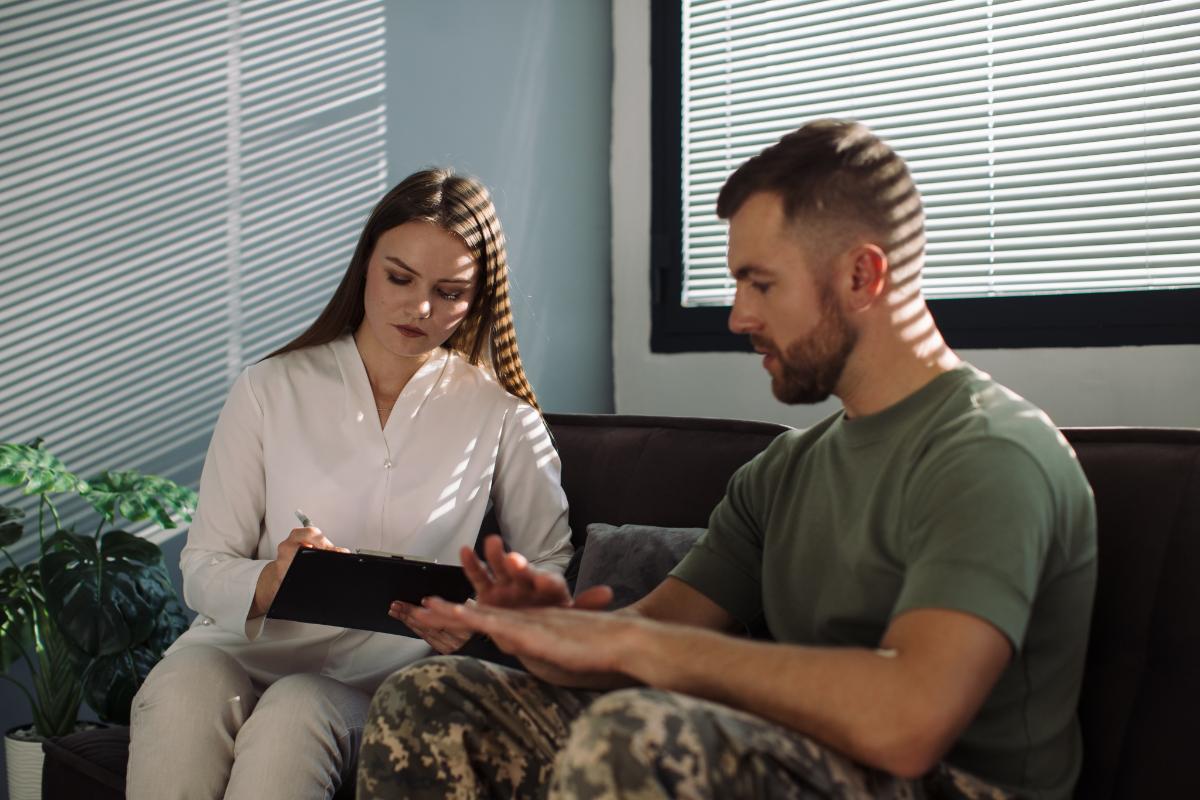Veterans often carry experiences from their service that can lead to mental health conditions, including post-traumatic stress disorder (PTSD). PTSD in veterans is a prevalent issue affecting every aspect of their lives, from their relationships to their professional endeavors.
However, it’s crucial to remember that help is available for those struggling. Veteran rehab centers are specialized facilities that understand the unique challenges veterans face. They offer a range of therapeutic interventions, including individual therapy, group sessions, and holistic treatments, all tailored to the specific needs of veterans with PTSD. This targeted approach in a supportive environment can significantly help veterans on their path to recovery.
How to Help a Veteran with PTSD
One of the most significant steps in helping veterans with PTSD is to encourage them to seek professional help and reassure them that it’s okay to reach out and share their experiences, as this is the first step toward healing. Here are some other ways to help veterans with PTSD:
Extend Your Patience and Understanding
It is important to appreciate that veterans with PTSD deal with a challenging mental health condition that may result in behavioral changes. Exhibiting patience and understanding can help them feel safe and respected. Encourage open conversation about their feelings if they feel comfortable, but avoid forcing discussions about their experiences.
Educate Yourself About PTSD
Educating yourself about PTSD can provide a better understanding of what the person is going through. This knowledge can help you empathize with them and provide appropriate support when necessary. Resources such as books, online articles, and professional advice are widely available to help you understand the intricacies of PTSD.
Encourage Professional Help
Professional help is vital for managing PTSD. If the veteran hesitates to seek help, gently encourage them to consider it. Discuss the benefits of treatment programs available at veteran rehab centers specifically designed to help veterans overcome PTSD.
Be Supportive
Lastly, constant support is critical to a veteran’s recovery journey. Be there for them emotionally and affirm their feelings. If needed, offer help with everyday tasks and provide a listening ear when they want to talk. Your unwavering support can make a significant difference in their recovery journey.
Benefits of PTSD Treatment for Veterans
PTSD treatment for veterans can offer a wealth of benefits that can dramatically improve their quality of life and aid them on their path to recovery. These benefits may include:
- Reduced symptoms – PTSD treatment for veterans can help to reduce the symptoms associated with this condition, such as flashbacks, nightmares, and severe anxiety. This can lead to an improved overall mental state and increased personal functionality.
- Improved coping mechanisms– Treatment often includes therapy that helps veterans develop healthier coping mechanisms to deal with stress and triggers related to their condition.
- Better relationships – As veterans begin to manage their PTSD symptoms more effectively, they may find their relationships improving. They can communicate their experiences more openly and build stronger connections with their loved ones.
- Enhanced quality of life – Ultimately, PTSD treatment for veterans can improve their quality of life. With the proper support and treatment, veterans can overcome the challenges posed by PTSD and lead fulfilling, productive lives.
These benefits highlight the importance of seeking professional help for veterans struggling with PTSD. Remember, your support and understanding can significantly affect their healing and recovery.
How Does Sober Living for Veterans Help with Recovery?
Sober living programs for veterans provide an essential platform for recovery, especially for those dealing with PTSD and substance use issues. These programs offer a stable, substance-free environment that fosters peer support, accountability, and a structured lifestyle.
Living alongside other veterans facing similar challenges, participants in a sober living program can build camaraderie and mutual understanding that assist in overcoming feelings of isolation. Furthermore, the structure and rules these programs implement, such as regular meetings and mandatory sobriety, help to reinforce the coping strategies learned during rehab. A sober living program acts as a stepping stone between intensive treatment and returning to daily life, significantly aiding veterans’ recovery.
Get Help with Finding Housing for Veterans with PTSD
Finding suitable housing is a critical aspect of supporting veterans with PTSD. A safe, comforting place to live can contribute significantly to their healing and recovery. Some organizations specialize in assisting veterans with PTSD to find appropriate housing. They consider factors like proximity to veteran rehab centers and access to other necessary resources. Some even provide sober living homes with a supportive, structured environment that reinforces the coping strategies taught during rehab.
If you know a veteran with PTSD needing housing, don’t hesitate to contact these organizations. They are equipped to provide the necessary assistance and guidance to ease this transition, making it a smoother, less stressful experience for the veteran.



